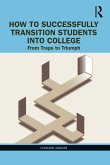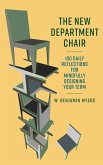Gretchen Oltman, Jeanne L. Surface, Kay Keiser
Prepare to Chair (eBook, ePUB)
Leading the Dissertation and Thesis Process
23,95 €
inkl. MwSt.
Sofort per Download lieferbar

12 °P sammeln
Gretchen Oltman, Jeanne L. Surface, Kay Keiser
Prepare to Chair (eBook, ePUB)
Leading the Dissertation and Thesis Process
- Format: ePub
- Merkliste
- Auf die Merkliste
- Bewerten Bewerten
- Teilen
- Produkt teilen
- Produkterinnerung
- Produkterinnerung

Bitte loggen Sie sich zunächst in Ihr Kundenkonto ein oder registrieren Sie sich bei
bücher.de, um das eBook-Abo tolino select nutzen zu können.
Hier können Sie sich einloggen
Hier können Sie sich einloggen
Sie sind bereits eingeloggt. Klicken Sie auf 2. tolino select Abo, um fortzufahren.

Bitte loggen Sie sich zunächst in Ihr Kundenkonto ein oder registrieren Sie sich bei bücher.de, um das eBook-Abo tolino select nutzen zu können.
Leading the thesis or dissertation process can be a challenging and rewarding experience. However, serving as a doctoral dissertation or master's thesis Chair is often a role assumed with very little faculty development and a lot of guesswork. Many new (and yes, even experienced) Chairs rely on the secondhand advice of seasoned faculty or on their own lived experiences as graduate students (both good and bad). This can lead to confusion, frustration, and contentious relationships. Without a chairperson who is invested and who has a clear set of best practices, both the Chair and the student…mehr
- Geräte: eReader
- mit Kopierschutz
- eBook Hilfe
- Größe: 2.06MB
Andere Kunden interessierten sich auch für
![Prepare to Chair (eBook, PDF) Prepare to Chair (eBook, PDF)]() Gretchen OltmanPrepare to Chair (eBook, PDF)23,95 €
Gretchen OltmanPrepare to Chair (eBook, PDF)23,95 €![The Path to Equity (eBook, ePUB) The Path to Equity (eBook, ePUB)]() Bill CoplinThe Path to Equity (eBook, ePUB)15,95 €
Bill CoplinThe Path to Equity (eBook, ePUB)15,95 €![How to Successfully Transition Students into College (eBook, ePUB) How to Successfully Transition Students into College (eBook, ePUB)]() Leonard GeddesHow to Successfully Transition Students into College (eBook, ePUB)33,95 €
Leonard GeddesHow to Successfully Transition Students into College (eBook, ePUB)33,95 €![Approaches to Assessment that Enhance Learning in Higher Education (eBook, ePUB) Approaches to Assessment that Enhance Learning in Higher Education (eBook, ePUB)]() Approaches to Assessment that Enhance Learning in Higher Education (eBook, ePUB)49,95 €
Approaches to Assessment that Enhance Learning in Higher Education (eBook, ePUB)49,95 €![Pedagogies for Teaching First-Generation College Students and the Dynamics of Globalized Classrooms (eBook, ePUB) Pedagogies for Teaching First-Generation College Students and the Dynamics of Globalized Classrooms (eBook, ePUB)]() Pedagogies for Teaching First-Generation College Students and the Dynamics of Globalized Classrooms (eBook, ePUB)45,95 €
Pedagogies for Teaching First-Generation College Students and the Dynamics of Globalized Classrooms (eBook, ePUB)45,95 €![The New Department Chair (eBook, ePUB) The New Department Chair (eBook, ePUB)]() W. Benjamin MyersThe New Department Chair (eBook, ePUB)21,95 €
W. Benjamin MyersThe New Department Chair (eBook, ePUB)21,95 €![Challenges to Research Universities (eBook, ePUB) Challenges to Research Universities (eBook, ePUB)]() Challenges to Research Universities (eBook, ePUB)15,95 €
Challenges to Research Universities (eBook, ePUB)15,95 €-
-
-
Leading the thesis or dissertation process can be a challenging and rewarding experience. However, serving as a doctoral dissertation or master's thesis Chair is often a role assumed with very little faculty development and a lot of guesswork. Many new (and yes, even experienced) Chairs rely on the secondhand advice of seasoned faculty or on their own lived experiences as graduate students (both good and bad). This can lead to confusion, frustration, and contentious relationships. Without a chairperson who is invested and who has a clear set of best practices, both the Chair and the student are left guessing as to the best course to proceed This book provides a clear set of best practices for the dissertation or thesis chairperson by providing hands-on tools, real-life illustrations, and practical advice for any faculty member guiding and coaching the student through the thesis or dissertation process.
Produktdetails
- Produktdetails
- Verlag: Bloomsbury eBooks US
- Seitenzahl: 172
- Erscheinungstermin: 24. Mai 2019
- Englisch
- ISBN-13: 9781475842630
- Artikelnr.: 56951266
- Verlag: Bloomsbury eBooks US
- Seitenzahl: 172
- Erscheinungstermin: 24. Mai 2019
- Englisch
- ISBN-13: 9781475842630
- Artikelnr.: 56951266
- Herstellerkennzeichnung Die Herstellerinformationen sind derzeit nicht verfügbar.
Gretchen Oltman has spent the past decade building and leading new academic programs. She is a tenured associate professor and program director of a graduate program at Creighton University in Omaha, Nebraska. A lifelong educator, she also holds a Ph.D. in educational studies, a law degree, and a master's degree in teaching.
Preface
Chapter 1- 10 Questions to Ask Before Accepting Your First Chair Assignment
Who is the student?
What are the institution's expectations of a Chair?
Where can I find policies and procedures regarding the process?
Who can I turn to for help?
What form or format does a thesis or dissertation need to be at this
university?
How do I know what I don't know? (and what if someone finds out what I
don't know??)
Does the methodology and topic the student hopes to use fit your expertise?
Do I have time for this?
Do I want to do this?
What am I bringing from my own experiences into this?
Chpater 2- Being a Chair
The Importance to the Student
The Importance to the Institution
The Importance to the Field of Study
The Importance to the Chair
The Chair as Leader
Takeaway Tips
Chapter 3- Crafting of the Committee
A Committee as an Organization
Storming Toward Consensus
Performing the Defense
Takeaway Tips
Chapter 4- Planning the Dissertation with the Candidate
Comfort the Afflicted
Afflict the Comfortable
Criteria to Set as Ground Rules
Impact of the Method on the Journey
Takeaway Tips
Chpater 5- Feedback and Failure
Setting Up Student/Chair Communication
Helping Students Understand the Timing of the Process
The Chair's Workload
Tears and Fears
Critical Feedback or Coaching?
Shouldn't the Student Already Know This?
Takeaway Tips
Chapter 6- The Ambiguity and Loneliness of the Graduate Student
The Mental Health Crisis Among Graduate Students
Encouraging Self-Care
Practice Makes Perfect
Chapter 7- Common Writing Issues
Guiding Student Writing
Building Habits with Online Tools
Tighten It Up
Emptying the Trash
Using Professional Voice
Plagiarism
The Internet and Other Writing Temptations
Synthesis
Revision
Stepping Away from the Paper
Takeaway Tips
Chapter 8- Problems, Delays, and Misunderstandings-Motivation and Insight
Building Relationship Through Understanding Style
Threatened Intent and Emerging Conflicts
Look in the Mirror
Data or Topic Dilemmas
Takeaway Tips
Chapter 9- Litigation Around the Dissertation and Thesis Process
Student/Faculty Relationship Fallout
Student Failure to Complete within a Designated Timeframe
Conflicts of Ownership and Authorship
Plagiarism
Takeaway Tips
Chapter 10- Preparing the Student for the Defense and Graduation
Preparing for the Defense Meeting
A Typical Committee Meeting
Handling Committee Questions
The Power of "I Don't Know"
The Decision
Celebrating Success
Addressing Failure
Publication and Shared Authorship
Takeaway Tips
Chapter 11- Avoiding Mistakes and Missteps
Misstep #1. Make everything into a battle.
Misstep #2. Repeat the same conflict, repeatedly.
Misstep #3. Rely on your memory.
Misstep #4. Avoid issues with a pocket veto.
Misstep #5. Let them guess when or if they will get feedback.
Misstep #6. Be reluctant to say NO to a student
Misstep #7: Be the grammar sheriff.
Misstep #8. Use jargon, vague terms, sarcasm, and conflicting directions so
students have to rewrite and revise repeatedly.
Misstep # 9. Ignore problems.
Misstep #10. Talk down other faculty members.
Misstep #11. Take advantage of students and junior faculty.
Misstep #12: Become too friendly or too close to the student.
Misstep #13: Assume the university will cover you, so don't watch your
back.
Misstep #14: Pretend that you do not make mistakes.
Steps in the Right Direction
Takeaway Tips
References
Appendix A: Beginning Chair Checklist
Appendix B: Preproposal, Prospectus, or Research Agreements
About the Authors
Chapter 1- 10 Questions to Ask Before Accepting Your First Chair Assignment
Who is the student?
What are the institution's expectations of a Chair?
Where can I find policies and procedures regarding the process?
Who can I turn to for help?
What form or format does a thesis or dissertation need to be at this
university?
How do I know what I don't know? (and what if someone finds out what I
don't know??)
Does the methodology and topic the student hopes to use fit your expertise?
Do I have time for this?
Do I want to do this?
What am I bringing from my own experiences into this?
Chpater 2- Being a Chair
The Importance to the Student
The Importance to the Institution
The Importance to the Field of Study
The Importance to the Chair
The Chair as Leader
Takeaway Tips
Chapter 3- Crafting of the Committee
A Committee as an Organization
Storming Toward Consensus
Performing the Defense
Takeaway Tips
Chapter 4- Planning the Dissertation with the Candidate
Comfort the Afflicted
Afflict the Comfortable
Criteria to Set as Ground Rules
Impact of the Method on the Journey
Takeaway Tips
Chpater 5- Feedback and Failure
Setting Up Student/Chair Communication
Helping Students Understand the Timing of the Process
The Chair's Workload
Tears and Fears
Critical Feedback or Coaching?
Shouldn't the Student Already Know This?
Takeaway Tips
Chapter 6- The Ambiguity and Loneliness of the Graduate Student
The Mental Health Crisis Among Graduate Students
Encouraging Self-Care
Practice Makes Perfect
Chapter 7- Common Writing Issues
Guiding Student Writing
Building Habits with Online Tools
Tighten It Up
Emptying the Trash
Using Professional Voice
Plagiarism
The Internet and Other Writing Temptations
Synthesis
Revision
Stepping Away from the Paper
Takeaway Tips
Chapter 8- Problems, Delays, and Misunderstandings-Motivation and Insight
Building Relationship Through Understanding Style
Threatened Intent and Emerging Conflicts
Look in the Mirror
Data or Topic Dilemmas
Takeaway Tips
Chapter 9- Litigation Around the Dissertation and Thesis Process
Student/Faculty Relationship Fallout
Student Failure to Complete within a Designated Timeframe
Conflicts of Ownership and Authorship
Plagiarism
Takeaway Tips
Chapter 10- Preparing the Student for the Defense and Graduation
Preparing for the Defense Meeting
A Typical Committee Meeting
Handling Committee Questions
The Power of "I Don't Know"
The Decision
Celebrating Success
Addressing Failure
Publication and Shared Authorship
Takeaway Tips
Chapter 11- Avoiding Mistakes and Missteps
Misstep #1. Make everything into a battle.
Misstep #2. Repeat the same conflict, repeatedly.
Misstep #3. Rely on your memory.
Misstep #4. Avoid issues with a pocket veto.
Misstep #5. Let them guess when or if they will get feedback.
Misstep #6. Be reluctant to say NO to a student
Misstep #7: Be the grammar sheriff.
Misstep #8. Use jargon, vague terms, sarcasm, and conflicting directions so
students have to rewrite and revise repeatedly.
Misstep # 9. Ignore problems.
Misstep #10. Talk down other faculty members.
Misstep #11. Take advantage of students and junior faculty.
Misstep #12: Become too friendly or too close to the student.
Misstep #13: Assume the university will cover you, so don't watch your
back.
Misstep #14: Pretend that you do not make mistakes.
Steps in the Right Direction
Takeaway Tips
References
Appendix A: Beginning Chair Checklist
Appendix B: Preproposal, Prospectus, or Research Agreements
About the Authors
Preface
Chapter 1- 10 Questions to Ask Before Accepting Your First Chair Assignment
Who is the student?
What are the institution's expectations of a Chair?
Where can I find policies and procedures regarding the process?
Who can I turn to for help?
What form or format does a thesis or dissertation need to be at this
university?
How do I know what I don't know? (and what if someone finds out what I
don't know??)
Does the methodology and topic the student hopes to use fit your expertise?
Do I have time for this?
Do I want to do this?
What am I bringing from my own experiences into this?
Chpater 2- Being a Chair
The Importance to the Student
The Importance to the Institution
The Importance to the Field of Study
The Importance to the Chair
The Chair as Leader
Takeaway Tips
Chapter 3- Crafting of the Committee
A Committee as an Organization
Storming Toward Consensus
Performing the Defense
Takeaway Tips
Chapter 4- Planning the Dissertation with the Candidate
Comfort the Afflicted
Afflict the Comfortable
Criteria to Set as Ground Rules
Impact of the Method on the Journey
Takeaway Tips
Chpater 5- Feedback and Failure
Setting Up Student/Chair Communication
Helping Students Understand the Timing of the Process
The Chair's Workload
Tears and Fears
Critical Feedback or Coaching?
Shouldn't the Student Already Know This?
Takeaway Tips
Chapter 6- The Ambiguity and Loneliness of the Graduate Student
The Mental Health Crisis Among Graduate Students
Encouraging Self-Care
Practice Makes Perfect
Chapter 7- Common Writing Issues
Guiding Student Writing
Building Habits with Online Tools
Tighten It Up
Emptying the Trash
Using Professional Voice
Plagiarism
The Internet and Other Writing Temptations
Synthesis
Revision
Stepping Away from the Paper
Takeaway Tips
Chapter 8- Problems, Delays, and Misunderstandings-Motivation and Insight
Building Relationship Through Understanding Style
Threatened Intent and Emerging Conflicts
Look in the Mirror
Data or Topic Dilemmas
Takeaway Tips
Chapter 9- Litigation Around the Dissertation and Thesis Process
Student/Faculty Relationship Fallout
Student Failure to Complete within a Designated Timeframe
Conflicts of Ownership and Authorship
Plagiarism
Takeaway Tips
Chapter 10- Preparing the Student for the Defense and Graduation
Preparing for the Defense Meeting
A Typical Committee Meeting
Handling Committee Questions
The Power of "I Don't Know"
The Decision
Celebrating Success
Addressing Failure
Publication and Shared Authorship
Takeaway Tips
Chapter 11- Avoiding Mistakes and Missteps
Misstep #1. Make everything into a battle.
Misstep #2. Repeat the same conflict, repeatedly.
Misstep #3. Rely on your memory.
Misstep #4. Avoid issues with a pocket veto.
Misstep #5. Let them guess when or if they will get feedback.
Misstep #6. Be reluctant to say NO to a student
Misstep #7: Be the grammar sheriff.
Misstep #8. Use jargon, vague terms, sarcasm, and conflicting directions so
students have to rewrite and revise repeatedly.
Misstep # 9. Ignore problems.
Misstep #10. Talk down other faculty members.
Misstep #11. Take advantage of students and junior faculty.
Misstep #12: Become too friendly or too close to the student.
Misstep #13: Assume the university will cover you, so don't watch your
back.
Misstep #14: Pretend that you do not make mistakes.
Steps in the Right Direction
Takeaway Tips
References
Appendix A: Beginning Chair Checklist
Appendix B: Preproposal, Prospectus, or Research Agreements
About the Authors
Chapter 1- 10 Questions to Ask Before Accepting Your First Chair Assignment
Who is the student?
What are the institution's expectations of a Chair?
Where can I find policies and procedures regarding the process?
Who can I turn to for help?
What form or format does a thesis or dissertation need to be at this
university?
How do I know what I don't know? (and what if someone finds out what I
don't know??)
Does the methodology and topic the student hopes to use fit your expertise?
Do I have time for this?
Do I want to do this?
What am I bringing from my own experiences into this?
Chpater 2- Being a Chair
The Importance to the Student
The Importance to the Institution
The Importance to the Field of Study
The Importance to the Chair
The Chair as Leader
Takeaway Tips
Chapter 3- Crafting of the Committee
A Committee as an Organization
Storming Toward Consensus
Performing the Defense
Takeaway Tips
Chapter 4- Planning the Dissertation with the Candidate
Comfort the Afflicted
Afflict the Comfortable
Criteria to Set as Ground Rules
Impact of the Method on the Journey
Takeaway Tips
Chpater 5- Feedback and Failure
Setting Up Student/Chair Communication
Helping Students Understand the Timing of the Process
The Chair's Workload
Tears and Fears
Critical Feedback or Coaching?
Shouldn't the Student Already Know This?
Takeaway Tips
Chapter 6- The Ambiguity and Loneliness of the Graduate Student
The Mental Health Crisis Among Graduate Students
Encouraging Self-Care
Practice Makes Perfect
Chapter 7- Common Writing Issues
Guiding Student Writing
Building Habits with Online Tools
Tighten It Up
Emptying the Trash
Using Professional Voice
Plagiarism
The Internet and Other Writing Temptations
Synthesis
Revision
Stepping Away from the Paper
Takeaway Tips
Chapter 8- Problems, Delays, and Misunderstandings-Motivation and Insight
Building Relationship Through Understanding Style
Threatened Intent and Emerging Conflicts
Look in the Mirror
Data or Topic Dilemmas
Takeaway Tips
Chapter 9- Litigation Around the Dissertation and Thesis Process
Student/Faculty Relationship Fallout
Student Failure to Complete within a Designated Timeframe
Conflicts of Ownership and Authorship
Plagiarism
Takeaway Tips
Chapter 10- Preparing the Student for the Defense and Graduation
Preparing for the Defense Meeting
A Typical Committee Meeting
Handling Committee Questions
The Power of "I Don't Know"
The Decision
Celebrating Success
Addressing Failure
Publication and Shared Authorship
Takeaway Tips
Chapter 11- Avoiding Mistakes and Missteps
Misstep #1. Make everything into a battle.
Misstep #2. Repeat the same conflict, repeatedly.
Misstep #3. Rely on your memory.
Misstep #4. Avoid issues with a pocket veto.
Misstep #5. Let them guess when or if they will get feedback.
Misstep #6. Be reluctant to say NO to a student
Misstep #7: Be the grammar sheriff.
Misstep #8. Use jargon, vague terms, sarcasm, and conflicting directions so
students have to rewrite and revise repeatedly.
Misstep # 9. Ignore problems.
Misstep #10. Talk down other faculty members.
Misstep #11. Take advantage of students and junior faculty.
Misstep #12: Become too friendly or too close to the student.
Misstep #13: Assume the university will cover you, so don't watch your
back.
Misstep #14: Pretend that you do not make mistakes.
Steps in the Right Direction
Takeaway Tips
References
Appendix A: Beginning Chair Checklist
Appendix B: Preproposal, Prospectus, or Research Agreements
About the Authors







